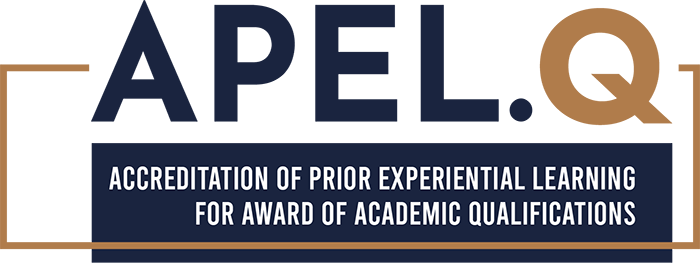Table of Contents
ToggleThe Future of Learning: Accreditation of Prior Experiential Learning for Qualifications is Essential for Lifelong Learning.
In today’s fast-paced world, learning has become a lifelong pursuit. With the rise of online courses, MOOCs, and experiential learning, people can acquire skills and knowledge through various means. However, this shift towards lifelong learning has highlighted a critical issue: recognizing and validating the skills and knowledge gained outside of a traditional classroom setting.
This is where the Accreditation of Prior Experiential Learning for Qualifications (APEL.Q) comes in. APEL.Q is a process that allows individuals to gain recognition for the skills and knowledge they have acquired through work, volunteer, or personal experiences. In this article, we will explore why APEL is essential for lifelong learning and the future of education.
What is Accreditation of Prior Experiential Learning for Qualification (APEL.Q)?
Accreditation of Prior Experiential Learning for Qualification (APEL.Q) is a process that recognizes and validates learning outside of traditional classroom settings. It is a method of assessing prior learning and awarding credits or qualifications based on the individual’s experiences. APEL.Q is a way of recognizing the value of experiential learning, which needs to be addressed in the conventional education system.

It is designed to be flexible and adaptable to the individual’s needs, allowing them to tailor their learning to their specific goals and interests. The process involves a series of steps, including identifying learning outcomes, assessing prior learning, identifying gaps in a person’s knowledge or skills, and developing a plan to fill those gaps. Hence, some target learners are illustrated to be the most suitable for this program.
You can refer to this link for better information about the APEL.Q suitable learners. Do not worry if you do not belong to any of those types; our team would help our best to complete the process.
The Importance of APEL.Q in Lifelong Learning
APEL.Q is essential for lifelong learning because it recognizes the value of experiential learning and allows individuals to build on their existing knowledge and skills. It provides a way for people to gain recognition for the education they have already done and to use that learning to achieve their personal and professional goals.

Lifelong learning is becoming increasingly important in today’s world, where the pace of change is accelerating. Individuals must adapt to new situations and acquire new skills and knowledge quickly. APEL.Q recognizes and accepts the candidate’s previous working experience and expertise in transferring credits as learning outcomes, which can convert to another degree at higher education programs.
Benefits of APEL.Q for Learners and Employers
APEL.Q provides many benefits for both learners and employers. For learners, it allows them to gain recognition for the skills and knowledge acquired through work, volunteer, or personal experiences. This recognition can help them to advance their careers, gain new opportunities, and achieve their personal goals.

APEL.Q also provides benefits for employers. It allows them to identify and recognize the skills and knowledge that their employees bring to the workplace. This recognition can help improve employee morale and engagement, increase productivity, and improve the organization’s overall performance.
Benefits for Learners
Recognition of Prior Learning
APEL.Q provides learners with recognition of their prior learning and experience, which they can use to gain academic credits and qualifications. This recognition can help learners to maintain and develop progress in their education and career path, as well as boost their confidence and motivation. Learners who have gained recognition for their prior learning and experience can stand out when applying for jobs or seeking promotion, as they can offer potential employers tangible evidence of their skills and abilities.

Besides, they can receive another higher education degree about their academic background from Université Libérale de Paris. You can read further information and instructions here.
Flexibility
Another benefit that the APEL.Q process offers learners is the flexibility to study at their own pace and in their own time. This means they can fit their studies around work and other commitments, allowing them to continue earning a living while learning. Learners who can balance work and research are likelier to complete their courses successfully, as they are less likely to experience burnout or stress. In addition, they can study from anywhere in the world, opening up opportunities for those who may not be able to attend traditional classes due to geographical or other constraints.
Cost-effective
Learners can follow APEL.Q as a cost-effective method to gain academic credits and qualifications. They can gain recognition for their prior learning and experience without paying for additional courses and assessments. This can be especially beneficial for learners who may not have the financial resources to pay for traditional approaches or may not have the time to attend classes in person. Additionally, by recognizing prior learning, APEL.Q can help learners avoid repeating courses or assessments they have already completed, saving their time and money.

Access to Higher Education
APEL.Q can provide learners access to higher education that may have been previously unavailable. Learners who may not have completed traditional education pathways or have taken a break from schooling can use APEL.Q to gain recognition for their prior learning and experience, allowing them to progress to higher education courses and qualifications.
For example, if the candidate had a bachelor’s degree in any field and worked for more than ten years, they would transfer the experience and work-related results to receive a higher degree.
Benefits for Employers
Improved Quality of Employees
APEL.Q enables employers to identify employees with the skills, knowledge, and experience required for a particular role. This means they can recruit and promote individuals based on their ability rather than their qualifications alone. By recognizing the value of prior learning and experience, employers can identify and nurture talent within their organization, leading to a more skilled and motivated workforce.

Additionally, by hiring employees who have gained recognition for their prior learning and experience through APEL.Q, employers can be assured of their ability to perform in the workplace, reducing the need for additional training.
Employee Retention
APEL.Q can help employers retain employees by providing them with career development and progression opportunities. Employees who feel their skills and experience are valued are likelier to stay with their current employer.
This can be especially important in industries with high turnover rates or a shortage of skilled workers. APEL.Q can also help employers identify employees who may be suitable for promotion or benefit from further training and development, increasing job satisfaction and employee retention.
Encourages Lifelong Learning
APEL.Q encourages employees to engage in lifelong learning by recognizing the value of their prior knowledge and experience. This can help to create a culture of continuous learning and improvement within the workplace. By promoting lifelong learning, employers can ensure that their workforce remains up-to-date with the latest industry trends and technologies, increasing productivity and competitiveness.

Furthermore, APEL.Q can help employers to identify potential areas for development and training, allowing them to invest in their employees and improve their skills and knowledge. They could have a better chance to explore and change their working environment for better financial status and experience.
Current Status of Higher Education Learning
APEL.Q is becoming increasingly recognized and valued in higher education. Many universities and colleges now offer these programs that allow individuals to gain credits or qualifications based on their prior learning. These are often designed to be flexible and adaptable, allowing individuals to tailor their knowledge to their specific needs and interests. Despite the growing recognition of APEL.Q in higher education, there are still challenges in implementing it.
One of the main challenges is the need for standardized processes and criteria for assessing prior learning. This can make it difficult for individuals to know what to expect from the APEL.Q process and make it challenging for institutions to evaluate prior knowledge consistently.
Challenges in Implementing the APEL.Q process
Several challenges in implementing APEL.Q could be mentioned as the requirement for standardized processes and criteria, the need for trained assessors, and the need to ensure the quality and consistency of the assessment process. There is also a need for greater awareness and understanding of APEL.Q among learners, employers, and educators.
Another challenge is ensuring that APEL.Q is recognized and valued by employers and other stakeholders. This requires a shift in mindset, where experiential learning is seen as a valuable and valid form of learning and where the recognition of prior learning is seen as an essential part of lifelong learning.
Future Prospects and Trends in higher education learning
The future of APEL.Q is promising as more and more institutions recognize the value of acknowledging and validating prior knowledge. There is a growing trend toward developing flexible and adaptable APEL.Q programs that allow individuals to tailor their education to their specific needs and interests.

One potential trend is the use of digital technologies to support APELQ. Digital technologies, such as e-portfolios and online assessment tools, can help to streamline the assessment process and make it more accessible and affordable for learners. This can be recognized through the proof and documents in demonstrating work experience.
Conclusion
In conclusion, Accreditation of Prior Experiential Learning (APEL.Q) is essential for lifelong learning and the future of education. It provides a way for individuals to gain recognition for the skills and knowledge they have acquired outside of traditional classroom settings and to use that learning to achieve their personal and professional goals.

APEL.Q is becoming increasingly recognized and valued in higher education, but there are still challenges in implementing it. However, with the growing trend towards flexible and adaptable APEL.Q programs and the potential use of digital technologies, the future of APEL.Q is promising.
We must continue to recognize and value learning outside of traditional education settings and work to ensure that APEL.Q is accessible, affordable, and high-quality for all learners.
For free consultancy, you can contact us through two of these methods.

